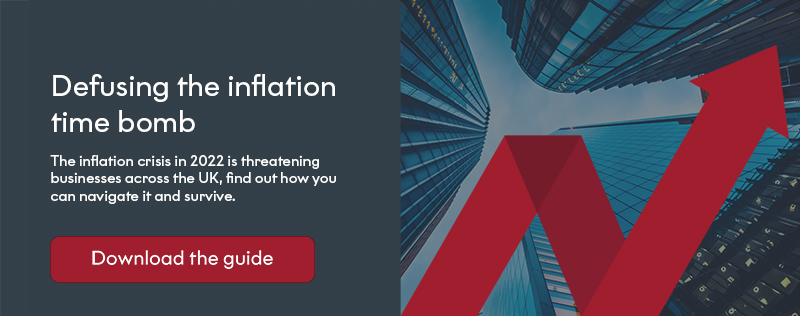What are the contrasts between the financial crisis of today and that of the 1970s, and what businesses can do to navigate these challenges?
Inflation: three strategies for businesses to thrive and survive
A fuel crisis, rising inflation rates, slow economic growth, burgeoning strikes and the emerging spectre of a Winter of discontent; today’s climate in the UK is startingly comparable with the Great Inflation of the 1970s.
Although not quite everything is the same. In the 70s, the strength of the social ‘safety net’ meant that nobody in full-time employment needed to use a foodbank to feed their families. While globalisation has led to cheaper goods today, there is a view that it may have lowered the sensitivity of inflation to ‘economic slack’ – that is, the amount of unused resources in an economy – and therefore globalised inflationary pressures.
In addition, today’s landscape sees the Government and the Bank of England appear to be implementing opposing strategies, with one side trying to stimulate economic activity by cutting taxes and the other seeking to manage inflationary pressures through interest-rate rises.

The bottom line is that, just as then, UK businesses are again in a challenging environment, driven this time by the collective impact of the COVID-19 pandemic and war in Ukraine.
Once again, turbulent times are creating opportunities for those capable of seeing, understanding and grasping them. Those companies that take a strategic, governance-based approach to addressing the challenges they face will create the resilience they’ll need to actively flourish – now, and into the months and years ahead.
Before pointing you towards the actions we believe all companies should be taking, arguably at all times regardless of economic conditions, let’s dive a little deeper into some of the issues they’re currently facing.

The landscape today
The energy sector was the first part of the UK economy to be hit by this latest wave of inflation, resulting in dramatic cost rises for businesses and households alike. Now we are feeling the impact everywhere. In some areas, the resulting damage could be long-lasting, particularly if companies award significant pay rises as a means of retaining their key talent. While a rapidly fluctuating energy price is something we are used to and can absorb over the long term, a parallel increase in wages would be much harder to reverse, resulting in spiralling pay and prices over the longer term which would in itself be perma-inflationary.
Clearly, wage settlements are one area where businesses need to take individual responsibility. Another is a lingering outcome of the pandemic’s residual impact, as many companies may seek to catch up on two years’ subdued activity by increasing prices above inflation.
The fundamentals at play
Every recession is unique with its own drivers and solutions, and every business and sector is affected differently, depending on their size and stage of development. Today, the ‘cost of living crisis’ is being driven by a fall in real disposable income that is fuelling wage inflation as people struggle to maintain the standards of living they are used to. Wage inflation is one of the three basic fundamentals, alongside energy costs and base-rate rises, that can affect businesses in potential recessionary times.
Unusually, all three are currently at play today. Recognising the impact of these fundamentals gives us clear guidance on how we can collectively address inflation now and defuse its future impact – which is particularly important today in light of our ageing population.

To succeed in the long term, we must first recognise that the current bout of inflation is one particularly damaging symptom of the volatile economic environment that has been gathering strength over recent years. These are extraordinary times, with a long-term trend towards volatility now intensified further by the perfect storm of a global pandemic, war in Europe – with associated constraints on the supply of Russian gas – and a 40-year peak in inflation, which is driving up commodity and energy prices.
But, if businesses successfully manage to adapt more quickly than these changes evolve, no matter their size or status, they will not merely survive; they will thrive in the better times to come.
While credit can be a good buffer to give you the leeway in challenging times, it’s only a short-term fix if your margins or operating model aren’t working for you. And while we recommend that you do get access to credit if the circumstances are right, you shouldn’t be surprised if current market conditions make this difficult or impossible.
It is within this context that we have identified three common-sense strategies, each usable by businesses of any size and in any sector, to help address the challenges that today’s economic environment is posing for businesses.
The three strategies for dealing with inflation:
- Pass on the cost
- Fix the cost and lock it in
- Reduce your costs
Common sense they may be, but that doesn’t mean they’re always easy to implement. So, we will be looking at each of them individually in a forthcoming set of three articles in which we’ll outline each issue, identify its solution, offer guidance and describe the actions we believe businesses need to take straight away.
Getting ahead of the curve
The solutions we recommend deliver far more than just addressing inflation-related issues. They empower you to put in controls that make your business more resilient, better at adapting to change and more able to predict the highs and lows of volatility.
In short, these strategies simply demonstrate and advocate good practice and good governance. However, putting them into practice might for certain companies involve a change in attitude across all levels of a workforce, from the shop-floor to the C-Suite.
Once inflation has its grip on your business, it is increasingly difficult to get back control. Act now and make your business volatility-proof.Ian CorfieldRestructuring Advisory Partner
Some businesses don’t or won’t approach challenging times with the same decisiveness as their more confident rivals, because they are concerned that taking bold decisions and advice might result in a self-fulfilling prophecy. In today’s climate however, being prepared to take bold but considered decisions might prove not only to be the key to survival but also to long-term success.
‘Considered’ is the key word here. Bold does not equal rashness. But going to enormous lengths to avoid any risk of failure, as so many UK companies do, can (and often does) bring about the exact opposite of what is intended. That is an irony we all need to understand as we chart the journey ahead of us.
Above all, in this environment speed is of the essence. A businesses’ corporate resilience is a key factor in their ability to withstand shocks. Early consultation opens up options and creates value, so it is imperative that companies grasp and implement change as soon as they can. Once inflation has its grip on your business, it is increasingly difficult to get back control. Act now and make your business volatility-proof.










